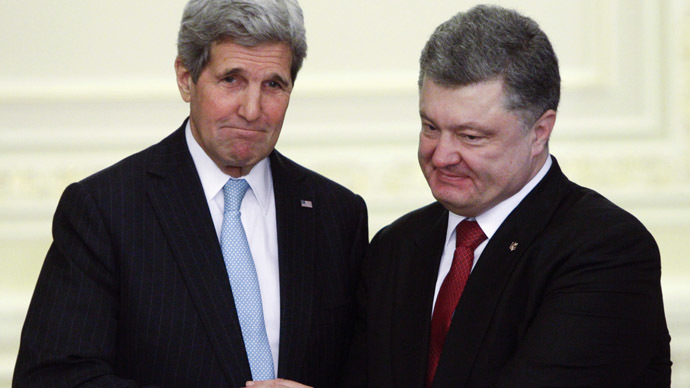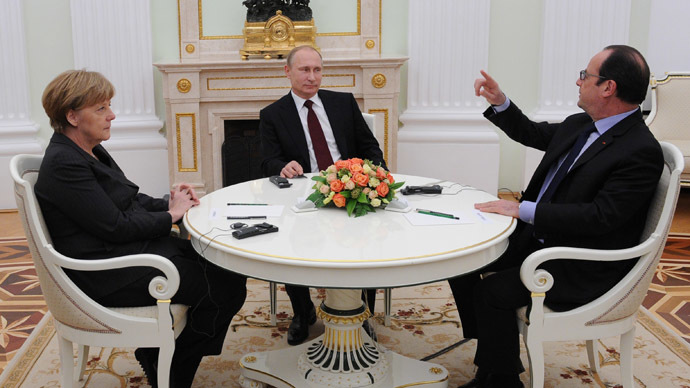‘US imperial overstretch: Washington reckless in calls to arm Kiev, should put Russia into context’

Washington should stop making dangerous moves, like arming Kiev with US weapons, and must put the Ukrainian conflict into a wider context of crises, cooperating with Russia to solve them, Martin Sieff, columnist for the Post-Examiner newspaper, told RT.
RT:The Moscow talks on Ukraine between the leaders of Russia, Germany and France are said to have been constructive and positive, although no details have been released yet. What do you thing we will be hearing?
Martin Sieff: I think we will be seeing an outlined document, I think there will be significant progress made towards the implementation of a ceasefire. [German] Chancellor [Angela] Merkel and [French] President [Francois] Hollande belatedly recognized the seriousness of what is happening in Ukraine, they do want to move back from the brink, they do want to restrain the Kiev government, they are strongly in favor on a negotiated settlement. The problems will be in Washington and Kiev, not in Paris and Berlin.
RT:We are told that we should be expecting a call on Sunday that will be held between Russia, Ukraine, Germany and France. Do you think they will be able to come forward with some sort of an agreement so that there could be joint progress?
MS: There is a possibility of it, but we will have to be cautious until we hear what comes out of the Sunday phone negotiations. The key rogue player here is Kiev. The West created [Ukrainian] President [Petro] Poroshenko, but he is in many respects the tail that wags the dog, they cannot always rein him in. He is the rogue player, he is the joker in this hand.

RT:What about America’s part, what is their role? US National Security Adviser Susan Rice said that Paris and Berlin are actually coordinating their efforts with the US, however, that hasn’t always looked like what’s happening on the surface. Do you think the decision could be reached with America at play?
MS: It can be reached, it should be reached, but that does not mean that it will be reached. I think you are correct, the term here in Washington has been much more in terms of “should we move more to deter Russia by sending weapons and arms to Ukraine.” Now that would be a very dangerous move to make indeed. General Philip Breedlove, the NATO commander, very senior American officer has indicated that he is in favor of this when he spoke at the Munich security conference. This would be a very bad sign indeed.
President Hollande, Chancellor Merkel seem to have a much greater sense of responsibility about the importance of getting a quick ceasefire and new negotiating framework or restore negotiating framework on the Minsk process in place. One does not sense the same sense of urgency in Washington. I do hope I am wrong in this assessment.
RT:Europe has decided not to send weapons to Ukraine. But we are hearing a lot of rhetoric from the US, including a recent fiery comment from John McCain – why are they still considering it as an option?
MS: I don’t think they [the US government] are listening to Berlin, I don’t think they are listening to Paris. I don’t think they are looking at the real situation on the ground in Ukraine, and I don’t think they’re putting this in the wider context of the crisis America is facing, the other crisis, in the Middle East, where they’re trying to contain ISIS [Islamic State] at the moment. Containing ISIS is quite enough for America to have on its hands after two exhausting war in Iraq and Afghanistan; they cannot afford to let Ukraine cut loose with American weapons and American support as well, that would be insane for the US, it would be an imperial overstretch.
RT:What will have to happen to achieve peace in Ukraine?
MS: I think what has to happen is that President [Barack] Obama and Secretary of State [John] Kerry need to swallow their pride and get a genuine bilateral relationship going again between President Putin and President Obama. And Secretary Kerry has to start talking seriously again as he did very effectively during his first years in office to [Russian] Foreign Minister [Sergey] Lavrov. The US-Russia relationship is the most important strategic relationship in the world. All other conflicts, including the Ukrainian one, have to be resolved in that context.
The United States also have to start recognizing that Ukraine is in Russia’s backyard, it’s a matter of much greater strategic importance to Russia than it is to the US, and it was American and European recklessness that unleashed the horrors of civil war in Ukraine over the past year. There is no sense of this in the American debate, and it needs to be revived.
The statements, views and opinions expressed in this column are solely those of the author and do not necessarily represent those of RT.












